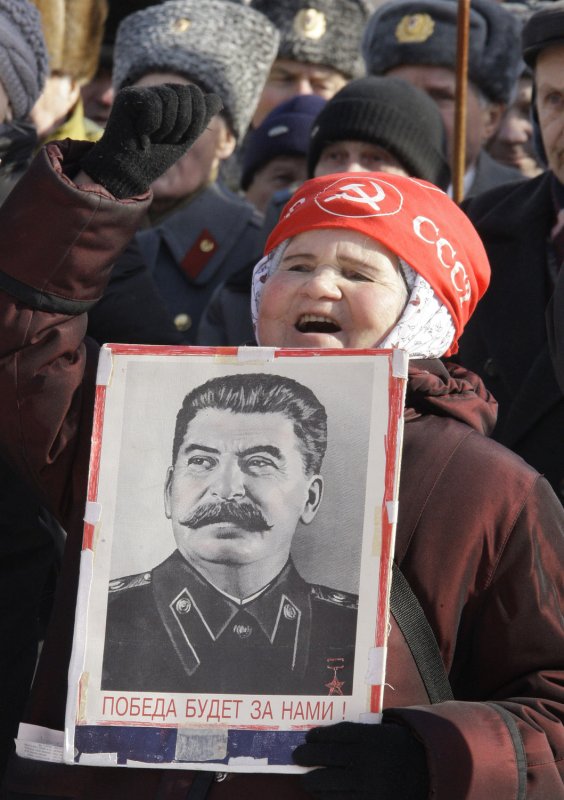A woman holds a portrait of of Soviet dictator Joseph Stalin during a communist rally to mark Defender of the Fatherland Day in Moscow on February 23, 2009. (UPI Photo/Anatoli Zhdanov) |
License Photo
BERLIN, Oct. 20 (UPI) -- A personality cult is emerging in Russia for one of history's most feared dictators, Joseph Stalin, responsible for the deaths of millions of his own people.
Even Stalin's admirers admit that he has sent millions of people into the Gulags, where many of them died; his agricultural policies are said to have exacerbated famines that killed an estimated 6 million to 8 million people; and most people around him lived in constant fear of falling victim to his paranoid tantrums -- but last year, Stalin took third place in a TV competition where viewers voted for the greatest Russian in history. The Communist Party said only manipulation prevented Stalin from winning the show.
Surveys indicate that the image of Stalin, who ruled the Soviet Union with an iron fist for nearly three decades until his death in 1953, has improved over the past years.
A July 2007 poll questioning Russian teenagers found that 54 percent of them agreed that Stalin did more good than bad; roughly half agreed that Stalin was a wise leader.
Stefan Meister, a Russia expert at the German Council on Foreign Relations, said this development is partly caused by government efforts to instill people who have lived in the Soviet Union with a sense of pride and national identity.
"The Kremlin wants to regain and in many instances has already regained the power of interpreting Soviet history," Meister told United Press International in a telephone interview Monday. "The young generation increasingly admires Stalin but knows very little about who he really was."
Many Russians still revere Stalin for his successes -- the military victory over Nazi Germany, the Soviet Union's economic boom in the 1950s and its rise to a Cold War superpower. Meister said state media have been emphasizing those successes while at the same time doing little to spread the details of the atrocities the dictator ordered during his reign.
Take, for example, the Great Purge, a period from 1937-1938 during which Stalin ordered the execution of hundreds of thousands of dissidents and sent millions into the Gulags, the feared slave labor camps in Siberia.
Meister said Stalin-critical voices such as NGOs get little room to spread the facts.
Last month agents of the FSB, the successor agency to the Soviet-era KGB, questioned Mikhail Suprun, a history professor in the northern Russian city of Arkhangelsk, over his research into mass deportations ordered by Stalin that took place in Russia six decades ago.
The FSB agents confiscated his personal archive, stored on computer hard drives that contain detailed information about the victims of the deportations. Authorities said Suprun with his research violated the victims' privacy rights.
Last year, as part of an investigation into extremism, police raided an office of NGO Memorial, seizing evidence of Stalinist crimes that the group had collected over two decades. Authorities returned the documents only after a lengthy court battle.
Russia's judicial system seems to be immune to Stalin's growing popularity: A Moscow court earlier this month ruled against Stalin's grandson Yevgeny Dzhugashvili and in favor of newspaper Novaya Gazeta, which in an article had referred to Stalin as a "bloodthirsty cannibal." The judge ruled that this description was not libel.





